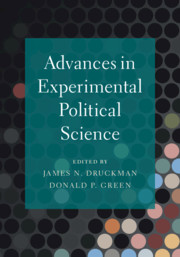Book contents
- Frontmatter
- Contents
- List of Figures
- List of Tables
- List of Boxes
- List of Contributors
- Acknowledgements
- 1 A New Era of Experimental Political Science
- Part I Experimental Designs
- Part II Experimental Data
- 8 Experiments, Political Elites, and Political Institutions
- 9 Convenience Samples in Political Science Experiments
- 10 Experiments Using Social Media Data
- 11 How to Form Organizational Partnerships to Run Experiments
- Part III Experimental Treatments and Measures
- Part IV Experimental Analys is and Presentation
- Part V Experimental Reliability and Generalizability
- Part VI Using Experiments to study Identity
- Part VII Using Experiments to Study Government Actions
- Author Index
- Subject Index
8 - Experiments, Political Elites, and Political Institutions
from Part II - Experimental Data
Published online by Cambridge University Press: 08 March 2021
- Frontmatter
- Contents
- List of Figures
- List of Tables
- List of Boxes
- List of Contributors
- Acknowledgements
- 1 A New Era of Experimental Political Science
- Part I Experimental Designs
- Part II Experimental Data
- 8 Experiments, Political Elites, and Political Institutions
- 9 Convenience Samples in Political Science Experiments
- 10 Experiments Using Social Media Data
- 11 How to Form Organizational Partnerships to Run Experiments
- Part III Experimental Treatments and Measures
- Part IV Experimental Analys is and Presentation
- Part V Experimental Reliability and Generalizability
- Part VI Using Experiments to study Identity
- Part VII Using Experiments to Study Government Actions
- Author Index
- Subject Index
Summary
The use of experiments to study the behavior of political elites in institutions has a long history and is once again becoming an active field of research. I review that history, noting that government officials within political institutions frequently use random assignment to test for policy effects and to encourage compliance. Scholars of political institutions have generally been slower than practitioners to embrace the use of experiments, though there has been remarkable growth in experimentation by scholars to study political elites. I summarize the domains in which scholars have most commonly used experiments, commenting on how researchers have seized opportunities to leverage random assignment. I highlight design challenges including limited sample sizes, answering theoretically-driven questions while partnering with public officials or others, and the difficulty of conducting replications. I then implore scholars to be bold in using experiments to study political institutions while also being mindful of ethical considerations.
Keywords
- Type
- Chapter
- Information
- Advances in Experimental Political Science , pp. 149 - 164Publisher: Cambridge University PressPrint publication year: 2021
- 5
- Cited by

